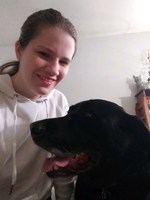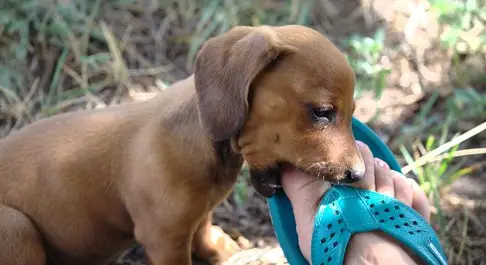If a 2 month old puppy bites, stand up, walk away, and ignore them for a few minutes, or redirect their behavior to a chew toy. If the bite breaks skin, watch for signs of infection and see a doctor if the wound doesn’t heal properly. They’re also teething at this age and are incredibly playful.
A 2 month old puppy will bite because they don’t yet know better.
In this article, I’ll discuss what to do if a 2 month old puppy bites you, including if they’re unvaccinated. I’ll also show you how to train your puppy not to bite, the best chew toys for puppies, and why puppies bite at this age.
It’s Normal for Puppies to Bite
It’s completely normal for a two month old puppy to bite. They are still learning so much about the world, and a lot of this learning is done by sticking things in their mouths.
Puppies don’t yet know not to bite people while playing either, because they haven’t been trained yet.
The reasons a puppy this young will bite are typically playfulness or teething. Sometimes, they may bite to protect themselves, a toy, a person, or another pet. Puppies may also bite due to feeling overwhelmed, fearful, annoyed, or angry.
More rarely, they may be injured or have a medical problem causing them to bite.
Of course, some of these are more concerning than others. You want to stop a hard biter fast before things get out of hand.
No matter why your puppy is biting, you should work on training them right away so that they don’t think the behavior is okay when they’re a grown dog.
Don’t Allow your Puppy to Bite
Just because biting is normal for puppies of this age doesn’t mean that you should allow your puppy to bite you.
It’s important to get a handle on this behavior before you end up with an adult dog who still thinks biting is okay.
Biting shouldn’t be allowed, no matter how hard your puppy bites or whether they’re only playing. It’s important to keep the rules consistent.
Stand up and walk away every time your puppy bites and ignore them for a few minutes. You’ll likely have to do this several times during a single activity until your puppy is trained.
For instance, you may be playing with your puppy and have to stop because they bite. Once you return to playing, they may bite again and you’ll have to ignore them again.
Eventually, though, they’ll get the point—it’ll just take time and patience.
Provide a Variety of Chew Toys
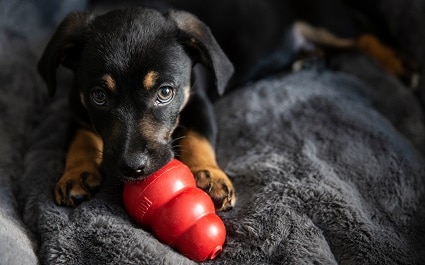
Puppies need a variety of toys, especially chew toys, at this age. It’s important to give them things to chew on that aren’t your fingers!
The best chew toys for puppies are:
- Soothing to their gums
- Durable and built to last
- The right size
- Free of choking hazards
Choking hazards are especially important to watch for. Many toys can be broken into pieces, especially by large breeds with strong jaws.
My dog Charlie used to spend time pinching rubbery toys with his teeth, slowly picking away at the material.
Tearing out the stuffing in plush toys is very common, and some dogs will eat it too.
Watch your puppy while they chew to make sure they aren’t damaging the toy, and take it away if it’s broken.
As your puppy grows, you may need to switch out their old toys so that they don’t choke on any that are now too small for them.
Toys Can Have Features Like Soothing Teething
Above are the basics, but there are also some additional features you may want to look out for that can make your puppy’s chewing even better.
Some chew toys cool your puppy’s gums to soothe the pain, and others have bumps on the surface that help clean their teeth as they chew.
Although the latter aren’t a replacement for brushing your puppy’s teeth or having them professionally cleaned, they can help lessen build-up between brushing.
You should also ensure that the toys you give your puppy aren’t shaped to look like something that’s off-limits to them. For example, some toys are shaped like shoes or prey animals.
If you’re like me and wish your dog would stop chasing squirrels in the yard, you shouldn’t encourage them to play with a toy that resembles one!
Toys that resemble off-limits items can confuse your puppy as to what the rules are, and make them think those things are okay to chew after all.
Have a Variety of Toys So They Don’t Get Bored
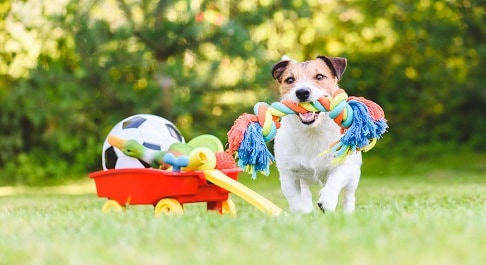
Lastly, don’t purchase a bunch of chew toys that all look the same, or are the same shape, size, or material.
Vary it up so your puppy doesn’t get bored, and so that they can form preferences. It can also save you money to buy one of each type of toy in the beginning.
Once you know what your puppy likes best, you can buy more of that, instead of spending a bunch of money on toys they don’t end up chewing or playing with.
See a Doctor for Severe Dog Bites
Typically, your puppy biting you won’t break skin. You may see teeth marks or redness that go away in a short period of time.
If your puppy does bite you and breaks the skin, wash the wound thoroughly and then press a clean cloth against it to stop any bleeding. Keep the bite clean and bandaged so that it doesn’t become infected.
Puppies’ mouths carry many bacteria, which increases your risk of infection.
Your bite wound is most likely to become infected if you don’t wash it away and keep it clean, or if the bite is deep.
If your puppy barely broke skin and you’ve cleaned and bandaged the wound, it’s less likely to become infected.
Signs of infection include:
- Redness
- Swelling
- Pus
- Pain or loss of feeling in the skin surrounding the bite
- Fever
- Chills
- Swollen lymph nodes
- Fatigue
- Difficulty breathing
- Muscle weakness
- Tremors
If you notice any signs of infection, or you’re concerned for another reason, see your doctor. It’s better to be safe than sorry when it comes to bite wounds.
People with weakened immune systems should be especially cautious when it comes to infected bite wounds.
Unvaccinated Puppies
Typically, it still isn’t a problem if your unvaccinated puppy bites you.
The main concern for a dog bite of any sort is the risk of rabies it presents, but a young puppy kept indoors is at little to no risk of rabies, so this isn’t something you should worry about.
However, if you don’t know the puppy that bit you or you were bit by a stray, you should seek medical attention and get a rabies vaccine just in case.
Tetanus
The next big concern you may have after being bitten by a dog is Tetanus. Tetanus is caused by bacteria and animal bites can cause the disease.
If the wound is very deep or infected and you aren’t up-to-date on your Tetanus vaccine, you may want to see your doctor for a booster.
If you’re unsure, speak with your doctor and see what they recommend.
What to Expect at the Doctor
Sometimes the unexpected can be scary and anxiety-inducing. In this section, I’ll discuss briefly what you can expect when going to the doctor for an infected bite wound.
Your doctor will likely ask some questions first, such as what bit you and when the bite happened. They’ll examine the wound to confirm infection.
They may recommend a rabies or Tetanus vaccine, depending on how you were bitten, how bad the bite wound and infection is, and when you were last vaccinated for Tetanus.
To treat the infection, they’ll likely prescribe antibiotics.
Of course, every visit will vary, and you should do what your doctor recommends in your case. Worse wounds or infections may require more intensive care.
But, hopefully, this gives you an idea of what to expect during your appointment.
Ignore or Redirect Biting to Stop it
In order to stop your puppy from biting, you’ll need to either ignore them or redirect them to an appropriate behavior.
Redirecting Biting
Since the most common reason for biting at this age is teething, you might consider keeping a chew toy on hand and giving it to your puppy every time they bite you.
Praise them when they chew the toy instead of you, and consider offering them a treat as well.
Do this every time they bite, and eventually they will learn the lesson that biting people isn’t okay, but biting toys is good.
You can do the same if your puppy is biting out of playfulness.
Ignoring Biting Can Be Better Than Redirecting
In some cases, it’s better to ignore your puppy than to redirect them. This doesn’t mean sitting there and letting your puppy bite you, but instead removing yourself or them from the situation and ignoring them for a few minutes.
If you’re on the couch and your puppy bites you, try placing them gently on the floor. If they get back up and bite again, put them onto the floor again.
You can also try putting them in their crate to calm down, so long as you’re careful not to use it as a punishment tool.
Lastly, you can leave the area yourself. This is a great way to put a closed door between the two of you and give you both time to relax.
It’s also a great solution for if your puppy is biting hard or continues to bite while you move them.
No matter how you choose to handle the situation, be sure to remain calm and have patience with your puppy.
Don’t Punish Biting
It’s tempting for many people to punish a puppy for biting. However, this is the wrong way to go about things.
Punishment may cause your puppy to fear you or even bite more in retaliation.
Things like holding your puppy’s mouth closed, scolding them, or hitting them should all be avoided as well.
Remind yourself that your puppy is young and doesn’t know better in order to handle the situation calmly.
The best thing to do when a puppy bites is to walk away and ignore them for a few minutes, or to redirect them as discussed above.
If you’re angry, feel free to take a bit more time away to calm yourself down.
Puppies Bite for Many Reasons
Teething
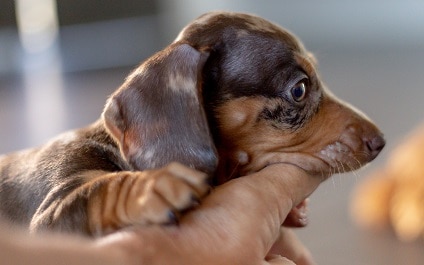
Puppies teethe until 6 months of age. During this time, their gums are sore and they chew to relieve that pain.
During this time, they’re also learning and exploring the world. Like human babies, they do this in large part by sticking things in their mouths.
Be sure to puppy-proof your home and provide plenty of chew toys. When a teething puppy bites you, redirect them to a toy so that they learn what’s appropriate to bite, and what isn’t.
Playfulness
The next most common reason a two month old puppy may bite is out of playfulness. This may be during play or when they want to play.
If your puppy bites during play, you should immediately stop the activity and walk away. This will teach them that biting means no more play time!
Praise your puppy when they play nice, and they’ll learn that this is what you want from them instead.
If your puppy bites because they want to play, ignore them for a few minutes so that the biting isn’t rewarded. Then, play with your puppy to get their energy out.
Also make sure your puppy is getting enough exercise throughout the day through short walks and play sessions.
Look into guidelines for their breed and age if you’re unsure how much activity your puppy needs, or ask your veterinarian for advice.
Don’t Give Attention For Doing Negative Things
Your puppy may like the attention they get when they bite, and this can cause the biting to become a habit.
Most commonly we think about positive attention, like laughing when your puppy bites or playing rough and allowing them to bite your hands.
However, negative attention can reinforce your puppy’s behavior as well. Some puppies think it’s funny if you yell, or that it means you’re as excited about playing as they are!
Other times, your puppy may know that you’re trying to discipline them, but they still find the negative attention better than no attention at all.
The solution to this is not to give your puppy attention when they bite, either positive or negative. Simply walk away and ignore them for a few minutes, like I discussed above.
Calm Them Down If They Are Overwhelmed
Your puppy may feel overwhelmed from too much attention, play, snuggles, or noise.
One common example is if you are cuddling your puppy too much. If you’re holding them when they want to be let go, they could feel overwhelmed or trapped by your arms. This may cause them to bite because they want down.
Play could also cause a puppy to be overwhelmed and overly tired. Instead of sleeping, they might become more riled up.
If possible, stop whatever is overwhelming your puppy.
If it’s cuddles or attention, let them go and give them time and space on their own.
If they are overwhelmed by play or noise, put them in a quiet place where they can calm down. If you’re crate training, the crate is an excellent place for this.
Be Genetle and Calm So They’re Not Fearful
Many things can scare a puppy. They’re still small and don’t understand many things about the world.
They might bite your feet because they’re afraid to be stepped on. Maybe you’ve approached them loudly and quickly, and they bite when you pick them up.
Try to be gentle and calm around your puppy, and never purposefully do things to scare them. Their reactions may seem cute or funny, but think about what they’re feeling too.
They Can Bite as they are Annoyaned or Angry
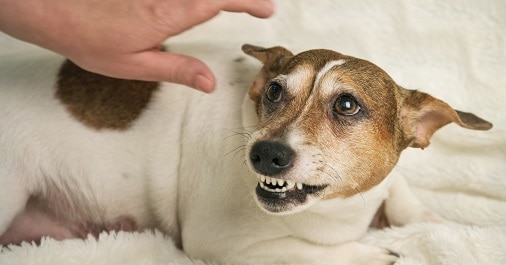
While true aggression is uncommon in pups this age, your puppy can bite out of annoyance or even anger.
Maybe they’ve snapped because you won’t leave them alone, for instance. Or you’ve messed with their food or favorite toy. Perhaps you’re teasing them too much.
Anger can also go hand in hand with fear. For example, if a puppy is being yelled at, they might feel fearful but also angry because they don’t know why you’re screaming.
Puppies Can Bite if Have Injuries or Medical Problems
Lastly, a puppy may bite if they are in pain or not feeling well.
An injured puppy may bite if you touch the area that hurts. A puppy with a medical problem may be feeling irritable and want to be left alone.
If you think something is wrong with your puppy, bring them to the veterinarian for a check-up.
Writer: Katelynn Sobus
